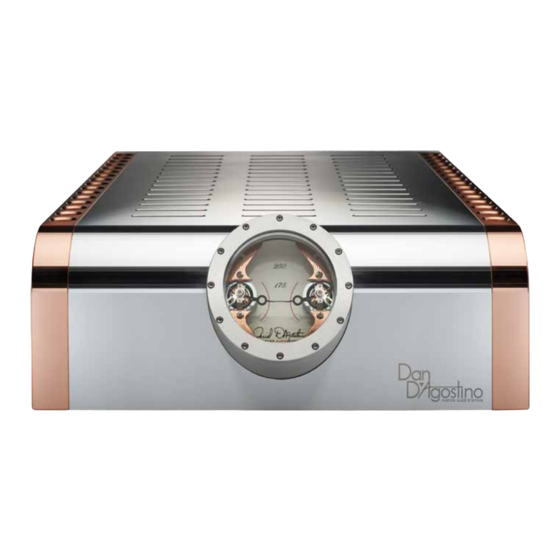- ページ 6
アンプ Dan D'Agostino MOMENTUM M400 MxVのPDF オーナーズマニュアルをオンラインで閲覧またはダウンロードできます。Dan D'Agostino MOMENTUM M400 MxV 9 ページ。

OPERATION
Initial power-up of the amplifier
The power button is located on the front underside edge of the amplifier. Pressing the button will
power up the amplifier and illuminate the power meter.
After power is switched on, the Momentum MvX amplifier requires approximately 30 minutes to
reach optimal operating temperature. Although the amplifier will sound excellent upon initial
listening, the sound quality will improve as it warms up, much as the flavor of a fine red wine
improves if it is allowed to breathe for a few minutes.
During operation
The Momentum MvX amplifier requires no adjustments during normal operation. If there is no
sound or the sound quality is in some way impaired, consult the "Troubleshooting" section.
Power meter settings
Two toggle switches on the back panel control the brightness and sensitivity of the power meter.
In order to prevent accidental operation, these switches are partially recessed. Use your finger to
gently move the switches.
Brightness switch: This switch has three positions. Move it to the left (when looking at the amp
from the rear) for height brightness and to the right for low brightness. In the center position the
light is off.
MAINTENANCE
The Momentum MvX amplifier requires no user maintenance other than to keep it clean and
ensure that the vents remain unobstructed.
To clean the amplifier, first disconnect the AC plug. Do not use polish or cleaners on the
Momentum MvX chassis. Use the supplied high-performance 3M micro fiber cloth and gently
wipe the amplifier's surface to remove dust. Do not use a circular motion. You can lightly moisten
the cloth with distilled water if necessary to remove fingerprints. A normal dusting cloth will not
scratch the surface, but any stitching on the edges of the cloth could scratch the surface of you
apply strong pressure.
If dust or other contaminants or objects collect around the heat sink venturis or the vents at
the top and bottom of the amplifier, remove small objects by hand and use a shop vacuum or
hand vacuum to remove the dust. Use a brush attachment on the vacuum to avoid scratching the
amplifier's surface.
8
TROUBLESHOOTING
Amplifier will not power up
If the front meter is not illuminated, follow the procedure outlined below. If one step succeeds in
activating the power, stop there and ignore the other steps.
1. Push the power switch on the front underside edge of the amplifier.
2. Check to make sure the AC cord is plugged into the wall outlet.
3. Check at the back of the amplifier to make sure the 15-amp IEC connector is pushed all the
way into the jack on the back of the amplifier.
4. Check to see that the fuse is blown. Replace with same type and rating only.
(In US, use only a 10 amp, slow-blow fuse.)
5. Check your household electrical box to make sure the circuit breaker has not been tripped.
If it has, flip the breaker back on.
6. If the breaker trips again, check the speaker cable connection on the amplifier and the
speaker to make sure that the terminals are not shorted, and check the entire length of
the cable to ensure there has been no damage to it.
7. If all of these steps fail to return power to the amplifier, consult your dealer for service.
Front meter is illuminated but you hear no sound
Follow these steps in order. If one step succeeds in restoring the sound, stop there and ignore
the other steps.
1. Check your preamp and source device to make sure they are both turned on.
2. Check the source device to make sure it is playing, i.e., if it's a record player, make sure it's
spinning and the tonearm is lowered, or if it's a CD player, make sure it's in play mode and
not in pause.
3. Make sure your preamp is not muted and that the desired source is selected.
4. Check the line-level connections between the source device and the preamp, and between
the preamp and the amplifier. Reconnect any cables that may have become disconnected.
5. Check the cables between the amplifier and the speakers to make sure they are properly
connected and that the cables have not become damaged.
6. If you have a spare pair of interconnect cables (even cheap ones will work temporarily),
try using them instead of the interconnect cables between the source device and the
preamp and between the preamp and the amplifier. If this restores sound, replace the
defective cables.
7. If all of these steps fail to restore sound, consult your dealer for service.
9
